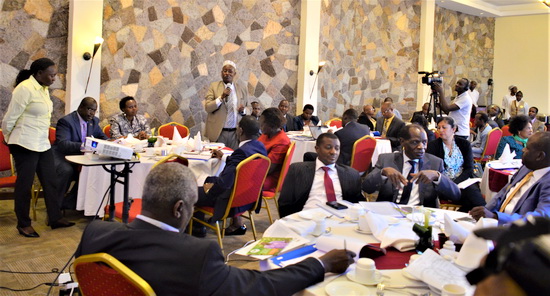
Kenyan Lawmakers Ask for Homegrown GM Crops Research
March 1, 2017| |
Kenya's parliamentarians have called on researchers to double their efforts in advancing what they called homegrown GM crops research to solve the country's food insecurity challenges. The Members of Parliament (MPs) drawn from Parliamentary Committee on Agriculture, Livestock and Cooperatives said the statement at a forum organized by the National Biosafety Authority (NBA), Program for Biosafety Systems (PBS) and Open Forum on Agricultural Biotechnology in Africa (OFAB-Kenya Chapter) on February 21, 2017.
The MPs also sought to explain the recommendations of the committee's report on GMOs that was tabled in parliament in December 2016. Led by committee chair Hon. Mohammed Noor, the legislators said that there is a need to kickstart commercialization of Bt cotton even if the government still needs to put in place biosafety measures to assure food and feed safety. "It should not be misunderstood that the committee is opposed to GMOs, rather, we want to encourage our local scientists to develop these technologies to address our unique challenges such as aflatoxin contaminations, drought, and pests," said Hon. Noor.
A host of other legislators called for stricter surveillance to ensure that the public does not consume unapproved GMO products in the market. "We want to be assured that the GMO products are safe before we can allow them in the Kenyan market," remarked Hon. Wachiari, a member of the committee. Dr. Willy Tonui, the Chief Executive Officer of NBA assured the lawmakers that should GMOs be allowed in the Kenyan market, any product with the approved by the authority would be safe. "MPs as people's representatives must have faith in the competence of NBA to ensure that Kenyan's food safety is assured even as we strive to let beneficial technologies in the country," said Dr. Tonui. "Kenyans should hold me, in my capacity as NBA's CEO, accountable for their biosafety when GM crops are allowed in the country."
Dr. Margaret Karembu, ISAAA AfriCenter Director, told the legislators that the GM crops have long history of safe use in other countries. "GM technology has been safely utilized by over 18 million farmers around the world for over 20 years with no reported incident of threat to human health," she added. "In any case, GM crops may be safer than their conventional counterparts due to the rigorous safety testing they go through before they can be commercialized," remarked Dr. Karembu. "We must allow ourselves to be guided by the Biosafety Act, 2009 and the biotechnology policy in any decision that we make concerning GM technology," said Dr. Mary Nyamongo, the Chairperson of NBA Board.

For more information concerning the event contact Dr. Margaret Karembu at mkarembu@isaaa.org
| |
Biotech Updates is a weekly newsletter of ISAAA, a not-for-profit organization. It is distributed for free to over 22,000 subscribers worldwide to inform them about the key developments in biosciences, especially in biotechnology. Your support will help us in our mission to feed the world with knowledge. You can help by donating as little as $10.
-
See more articles:
-
News from Around the World
- NABDA Trains Seed Council on GM Seeds Detection
- Media Houses in Uganda Call for Increased Public Sensitization on GMOs
- Mozambique Plants First GM Maize Field Trial
- Kenyan Lawmakers Ask for Homegrown GM Crops Research
- Iowa State University Researchers Identify Genetic Mechanisms that Govern Plant Growth and Drought Response
- Penn State Research Challenges Widely Accepted Vision for Agriculture, Says it may be Inaccurate, Misleading
- New Gene for Atrazine Resistance Found in Waterhemp
- US EPA Approves Three Varieties of GE Potatoes
- Australian OGTR Receives License Application for Field Trial of GM Sorghum
- Young Scientist Award Goes to Hidden Hunger Fighter
-
Research Highlights
- The Importance of NAC Gene Family in Developing Drought-Resistant Soybean
- BdPP2CA6 Gene Positively Regulates Salt Tolerance in Transgenic Arabidopsis
-
Beyond Crop Biotech
- Gene-Edited Pigs Resist Major Viral Disease
-
Plant
- Gene Editing Could Boost Vegetable Supplies
- Development of High-Amylose Rice through CRISPR/Cas9
-
Read the latest: - Biotech Updates (January 14, 2026)
- Gene Editing Supplement (December 17, 2025)
- Gene Drive Supplement (February 22, 2023)
-
Subscribe to BU: - Share
- Tweet
